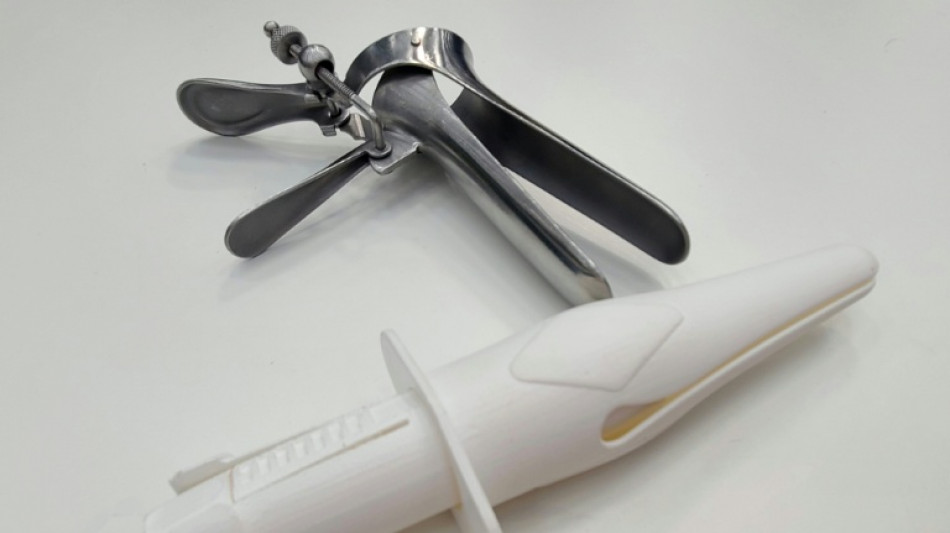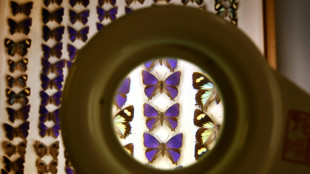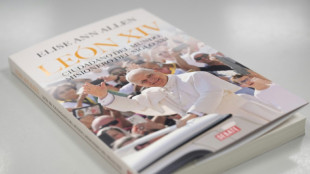
-
 Wallabies scrum-half Gordon back fit for Bledisloe Cup clashes
Wallabies scrum-half Gordon back fit for Bledisloe Cup clashes
-
US vaccine panel to hold high-stakes policy meeting

-
 In Nigeria's nightclubs, the bathroom selfie is king - or, rather, queen
In Nigeria's nightclubs, the bathroom selfie is king - or, rather, queen
-
Glitter and Soviet nostalgia: Russia revives Eurovision rival contest

-
 EU seeks 'face-saving' deal on UN climate target
EU seeks 'face-saving' deal on UN climate target
-
Busan film competition showcases Asian cinema's 'strength'

-
 Senational Son bags first MLS hat-trick as LAFC beat Real Salt Lake
Senational Son bags first MLS hat-trick as LAFC beat Real Salt Lake
-
Title rivals Piastri, Norris bid to secure teams' crown for McLaren

-
 Europe, Mediterranean coast saw record drought in August: AFP analysis of EU data
Europe, Mediterranean coast saw record drought in August: AFP analysis of EU data
-
Australia unveils 'anti-climactic' new emissions cuts

-
 Warholm and Bol headline hurdling royalty on Day 7 of Tokyo worlds
Warholm and Bol headline hurdling royalty on Day 7 of Tokyo worlds
-
'Raped, jailed, tortured, left to die': the hell of being gay in Turkmenistan

-
 Asian markets fluctuate after Fed cuts interest rates
Asian markets fluctuate after Fed cuts interest rates
-
Dodgers ponder using Ohtani as relief pitcher

-
 US adversaries stoke Kirk conspiracy theories, researchers warn
US adversaries stoke Kirk conspiracy theories, researchers warn
-
Jimmy Kimmel show yanked after government pressure on Kirk comments

-
 Canada confident of dethroning New Zealand in Women's World Cup semis
Canada confident of dethroning New Zealand in Women's World Cup semis
-
Australia vows to cut emissions by 62 to 70% by 2035

-
 Top UN Gaza investigator hopeful Israeli leaders will be prosecuted
Top UN Gaza investigator hopeful Israeli leaders will be prosecuted
-
Japan seeks to ramp up Asian Games buzz with year to go

-
 Judge weighs court's powers in Trump climate case
Judge weighs court's powers in Trump climate case
-
Australian scientists grapple with 'despicable' butterfly heist

-
 US faces pressure in UN Security Council vote on Gaza
US faces pressure in UN Security Council vote on Gaza
-
As media declines, gory Kirk video spreads on 'unrestrained' social sites

-
 'I don't cry anymore': In US jail, Russian dissidents fear deportation
'I don't cry anymore': In US jail, Russian dissidents fear deportation
-
Jimmy Kimmel show off air 'indefinitely' after his Kirk comments

-
 Meta expands AI glasses line in a bet on the future
Meta expands AI glasses line in a bet on the future
-
Trump's UK state visit gets political after royal welcome

-
 Pope Leo puts the brake on Church reforms
Pope Leo puts the brake on Church reforms
-
ABC says Jimmy Kimmel off air 'indefinitely' after Charlie Kirk comments

-
 Tourists return to Peru's Machu Picchu after community protest
Tourists return to Peru's Machu Picchu after community protest
-
Simeone calls for more protection after Liverpool scuffle

-
 Trump gets lavish UK banquet - and an awkward guest
Trump gets lavish UK banquet - and an awkward guest
-
Colombia's Restrepo aims to make history as World Athletics head

-
 US stocks finish mixed as Fed cuts rates for first time in 2025
US stocks finish mixed as Fed cuts rates for first time in 2025
-
Palmer blames 'lack of concentration' for Bayern defeat

-
 12-million-year-old porpoise fossil found in Peru
12-million-year-old porpoise fossil found in Peru
-
Van Dijk grabs Liverpool win, PSG start Champions League defence in style

-
 Kane doubles up as Bayern sink Chelsea in Champions League
Kane doubles up as Bayern sink Chelsea in Champions League
-
Van Dijk snatches Champions League win for Liverpool as Simeone sees red

-
 Cardi B expecting child with football player boyfriend Diggs
Cardi B expecting child with football player boyfriend Diggs
-
Kvaratskhelia stunner helps holders PSG to winning Champions League start

-
 Thuram on target as Inter Milan cruise at Ajax
Thuram on target as Inter Milan cruise at Ajax
-
Chimps ingest alcohol daily: study

-
 With eye on US threat, Venezuela holds Caribbean military exercises
With eye on US threat, Venezuela holds Caribbean military exercises
-
Only 40% of countries have booked lodging for Amazon climate meet

-
 Louboutin taps Jaden Smith to lead well-heeled shoemaker's men's line
Louboutin taps Jaden Smith to lead well-heeled shoemaker's men's line
-
Pakistan beat UAE to set up India rematch in Asia Cup

-
 US Fed makes first rate cut of 2025 over employment risks
US Fed makes first rate cut of 2025 over employment risks
-
US sprint star Kerley joins drug-fueled Enhanced Games


Researchers redesign vaginal speculum to ease fear and pain
It is cold, hard, metallic and commonly associated with pain. Not a mediaeval torture instrument, but the vaginal speculum used every day around the world for essential gynaecological exams.
Two engineers at Delft University in the Netherlands are now rethinking the decades-old design of the speculum -- long dreaded by many patients -- to make it less intimidating and less painful.
"I have a lot of experience with the vaginal speculum, unfortunately," Tamara Hoveling, one of the researchers behind the project, told AFP.
"I've never seen it as a pleasurable experience and I've always wondered why it looks like this."
- Sombre history -
The PhD candidate in medical industrial design then delved into the dark history behind the creation of the speculum, one version of which was developed by United States doctor James Marion Sims 180 years ago.
It was "tested on enslaved women without permission", said the 29-year-old.
"So that motivated me even more to take on this project."
Hoveling teamed up with Ariadna Izcara Gual, who was then working on her master's in industrial design engineering at Delft.
"As I was doing a lot of interviews, I was doing those sort of sketches with the same sort of shape but people were still scared of the device", said the 28-year-old Spanish researcher.
The Cusco speculum, the most commonly used model, is a metal device with a handle, beak and screw to adjust how wide it opens once inside the vagina.
For many, its insertion is uncomfortable or even painful and causes anxiety.
"Then the speculum is opened, pushing against these tense muscles and making it even more painful," Hoveling said.
"So I tried to look for shapes that might be related to the reproductive organs, like for example the flower, that also opens."
- Patient-friendly design -
The result was a prototype called the Lilium -- named after the lily flower.
Like the more familiar tampon, it has soft plastic and an applicator.
"It's designed with the patient in mind rather than the doctor.
"And we're really trying to improve the comfort aspect in a sensitive spot."
The Lilium also meets doctors' needs. Its three-sided opening keeps the vaginal walls from collapsing, allowing better visibility during examinations.
The Lilium remains at an early stage, with further ergonomic testing and material research needed to refine the prototype.
The researchers must still secure safety certifications, run human trials and obtain regulatory approval before it can reach clinics.
- Dazzling success -
To fund the next phase, they launched a crowdfunding campaign that quickly drew media attention in the Netherlands.
Within just two days, the campaign raised 100,000 euros ($117,000) -- far surpassing expectations.
"It's also a sign. It's proof there are people who really want change, that there is a real problem here and that the current market solutions are not the best," Hoveling said.
"I've received a lot of emails from women who told me they actually don't go to the gynaecologist because of this device, because they're scared, because they have a traumatic experience."
Cervical cancer is the fourth most common cancer among women, according to the World Health Organization.
It can be detected via a smear test or HPV screening -- both performed using a speculum.
With funding to allow this new gynaecological tool to be developed properly, the Lilium could be saving lives within five years.
C.Kreuzer--VB
